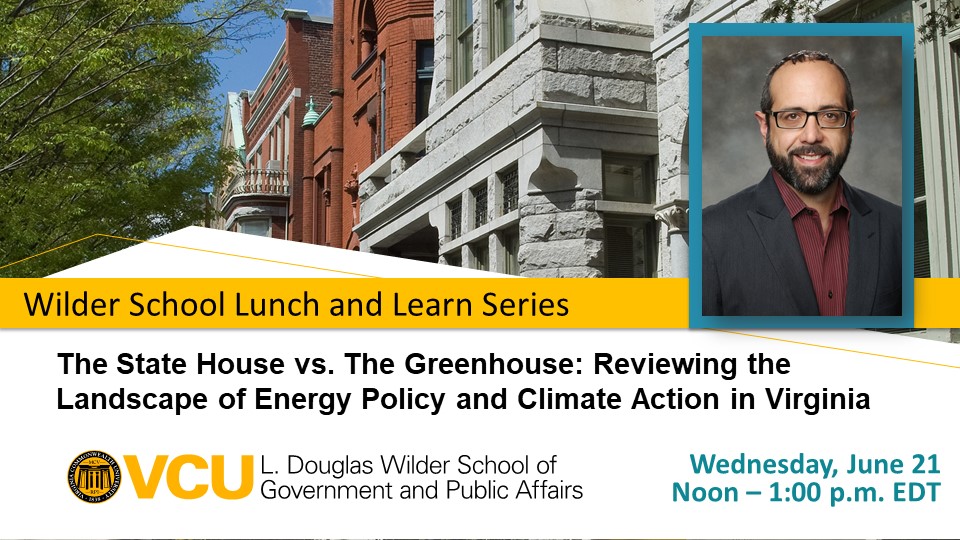News
“The State House vs. the Greenhouse: Reviewing the Landscape of Energy Policy and Climate Action in Virginia” with Damian Pitt, Ph.D.

By Rachel Zeeve
Where does energy policy stand in Virginia? What are some leading strategies for advancing equity-focused clean energy? Damian Pitt, Ph.D., associate professor in the Wilder School’s urban and regional studies and planning program, addressed these questions and more during a virtual Lunch and Learn session titled, “The State House vs. the Greenhouse: Reviewing the Landscape of Energy Policy and Climate Action in Virginia” on June 21.
Moderated by Meghan Z. Gough, Ph.D., an associate professor of urban and regional planning, the session illuminated key insights about the political and social contexts surrounding climate issues that impact communities globally.
Pitt discussed the scientific foundations of global warming and climate change, as well as potential actions policymakers can take to address these issues in the future. He emphasized the importance of transitioning from fossil fuels to clean energy, reducing greenhouse gas emissions (GHGs) and other air and water pollutants, and decreasing energy use by buildings and transportation. Pitt envisions tangible outcomes resulting from these measures, including improved quality of life through better technologies.
“There's an opportunity for quality-of-life benefits associated with better technologies and more energy efficient homes,” said Pitt.
“Additionally, reducing our energy bills related to fossil fuel dependency can bring economic boons. Investing in new clean energy technologies and transitioning to clean energy can lead to broader economic benefits and spin-off community economic advantages. Solar power already represents the most cost-effective source of new electricity generation capacity, closely followed by natural gas and wind energy. Furthermore, wind and solar sectors generate more jobs compared to any other individual sector within electric power generation.”
The transition to clean energy carries various policy implications. Pitt examined the Regional Greenhouse Gas Initiative (RGGI), a multi-state carbon allowance trading program that reduces GHGs and raises state revenue. Remaining in RGGI through 2030 could fund energy efficiency improvements for up to 130,000 homes,among other benefits. RGGI has played a key role in addressing disparities across racial and socioeconomic lines, particularly concerning the high “energy burden” experienced by low-income households.
“If we were to actually leave RGGI and stop collecting that revenue, the amount of money available for low-income energy efficiency would drop by two-thirds,” explained Pitt. “The positive economic impacts of this program, including induced and indirect effects, is over $2 billion.”
However, RGGI has faced opposition, including from the Youngkin Administration. Virginia has initiated the process of withdrawing from the program following a 4-3 vote from the Air Pollution Control Board. Read more about the significance of this repeal here.
“The worst thing we could do from a social equity standpoint is not transition to clean energy, because that means that we're going to experience the most extreme impacts of climate change in the future,” said Pitt. “Those impacts will be experienced disproportionately by marginalized populations throughout the world, including black and brown populations here in America.”
As the associate director of policy and community engagement with the new Institute of Sustainable Energy and Environment (ISEE) at VCU, Pitt also highlighted the transformative impact that this new interdisciplinary research center has on the campus community and beyond. The institute’s mission is to “pursue innovative scientific, technological, policy and social justice solutions addressing the climate and energy crisis.” Through its cutting-edge internship program, students have the opportunity to gain hands-on experience with government and nonprofit organizations in the field.
As Virginia continues to navigate interconnected challenges of climate justice and political controversy, ISEE and Pitt bring vital research and expertise to these critical conversations.
About the speaker
Damian Pitt, Ph.D., focuses his research on state and local governments' role in transitioning to clean and renewable energy. He has authored academic articles, reports, and studies for the Virginia Department of Energy, Richmond Office of Sustainability, and solar energy organizations. His recent research explores the economic and social equity benefits of low-income energy efficiency funding through Virginia's participation in the Regional Greenhouse Gas Initiative. Pitt served as a gubernatorial appointee to the Virginia Solar Energy Development and Energy Storage Authority from 2018-22. In 2015, he received a VCU Presidential Quest Fund Award for his collaborative project on optimizing grid integration of distributed solar energy.
About the moderator
Meghan Z. Gough, Ph.D., is a community-engaged scholar who studies and promotes civic capacity building and planning for more livable and equitable communities through collaborative decision-making and partnerships. Her teaching and research focus on the importance of local knowledge and asset-based approaches for inclusive plan-making and engagement processes. Her publications contribute to knowledge about power and process in the design and implementation of sustainable community development.